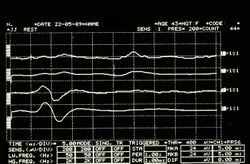Difference between revisions of "'The logic of the probabilistic language'"
| Line 35: | Line 35: | ||
== Conclusion == | == Conclusion == | ||
In conclusion, the text "The Logic of Probabilistic Language in Medicine" presents a robust argument for the necessity of integrating probabilistic models and interdisciplinary approaches in medical practice. It calls for a paradigm shift in how medical professionals handle uncertainty, with a move towards more nuanced and adaptable methodologies that can lead to better patient outcomes. The document envisions a future where the fusion of probabilistic reasoning, advanced technology, and collaborative scientific efforts results in a new era of precision in diagnostics and personalized patient care. | In conclusion, the text "The Logic of Probabilistic Language in Medicine" presents a robust argument for the necessity of integrating probabilistic models and interdisciplinary approaches in medical practice. It calls for a paradigm shift in how medical professionals handle uncertainty, with a move towards more nuanced and adaptable methodologies that can lead to better patient outcomes. The document envisions a future where the fusion of probabilistic reasoning, advanced technology, and collaborative scientific efforts results in a new era of precision in diagnostics and personalized patient care. | ||
<center><div class="colour-button">[[Special:UserLogin&returnto=Introduction+Page|Read the full chapter]]</div> | |||
</center> | |||
<blockquote> | |||
== Strategic dental topics for authors to subscribe an article == | |||
Probabilistic Language, Medical Field, Uncertainty Management, Subjective Uncertainty, Randomness in Medicine, Objective Probability, Clinical Decision-Making, Probabilistic-Causal Analysis, Differential Diagnosis, Interdisciplinary Approach, Fuzzy Logic, Medical Diagnostics, Treatment Efficacy, Precision Medicine, Personalized Patient Care</blockquote> | |||
Probabilistic Language, Medical Field, Uncertainty Management, Subjective Uncertainty, Randomness in Medicine, Objective Probability, Clinical Decision-Making, Probabilistic-Causal Analysis, Differential Diagnosis, Interdisciplinary Approach, Fuzzy Logic, Medical Diagnostics, Treatment Efficacy, Precision Medicine, Personalized Patient Care | |||
Revision as of 15:57, 28 April 2024
'The logic of the probabilistic language'
Abstract
The document delves into the probabilistic language in medicine, underlining how inherent uncertainties in scientific practice can be addressed using probabilistic and statistical tools. The distinction between subjective uncertainty, which pertains to individual knowledge and beliefs, and randomness, which involves unpredictability in events, is emphasized. Through various probabilistic methods, the text aims to offer a framework for understanding and managing these uncertainties in medical theories and practices.
Introduction
The introductory section sets the stage for discussing the integration of probabilistic approaches into the medical field. It highlights the challenges and necessities of managing uncertainties inherent in medical diagnosis and treatment. Probabilistic methods are presented as essential tools for bridging the theoretical knowledge of medicine with practical clinical observations, thereby enhancing decision-making processes.
The Role of Probability in Medical Practice
This segment discusses the pivotal role that probability plays in linking medical theories to clinical observations. It explains the concepts of subjective and objective probabilities, which are crucial for understanding and managing uncertainties in medical practice. Subjective probability is associated with individual beliefs and knowledge, whereas objective probability is grounded in empirical evidence and data. The application of these probabilistic models is shown to be vital for informed clinical decision-making.
Understanding Uncertainty in Clinical Settings
Here, the focus shifts to the complexities of dealing with uncertainty in clinical environments. The section outlines how probabilistic reasoning helps clinicians manage both subjective uncertainties, which are tied to individual perceptions, and objective uncertainties, which relate to measurable factors. Examples from various medical scenarios illustrate how probabilistic thinking enhances diagnostic accuracy and treatment efficacy.
Probabilistic-Causal Analysis in Diagnostics
Probabilistic-causal analysis is explored in detail, showing how it helps quantify relationships between different medical events and outcomes. This approach uses conditional probabilities and causal relevance partitioning to refine the accuracy of differential diagnoses. This methodological advancement aids clinicians in making more precise diagnostic and treatment decisions, reducing the potential for errors and improving patient outcomes.
Interdisciplinarity and Managing Uncertainty
The importance of an interdisciplinary approach in addressing complex medical challenges is highlighted in this section. It argues for integrating insights from various scientific disciplines to enhance the understanding and treatment of complex diseases. Furthermore, the section introduces fuzzy logic as a valuable tool for handling the inherent vagueness and ambiguity in medical contexts, offering a more nuanced approach to patient care.
Fuzzy Logic and Its Application in Medicine
An in-depth exploration of fuzzy logic and its application within the medical field is provided. This segment describes how fuzzy logic can be used to address the uncertainties and imprecise nature of many medical conditions, facilitating better diagnostic and treatment methodologies. Examples include its use in diagnostic algorithms and treatment decision processes, where traditional binary logic fails to capture the subtleties of human health conditions.
Future Directions in Medical Methodology
The document discusses the evolving landscape of medical research and practice, advocating for a dynamic adaptation of medical methodologies to incorporate probabilistic logic and interdisciplinary insights. This section envisions a future where medical practices are continuously updated and refined in response to advancements in scientific research, ensuring that patient care remains at the forefront of technological and methodological innovations.
Conclusion
In conclusion, the text "The Logic of Probabilistic Language in Medicine" presents a robust argument for the necessity of integrating probabilistic models and interdisciplinary approaches in medical practice. It calls for a paradigm shift in how medical professionals handle uncertainty, with a move towards more nuanced and adaptable methodologies that can lead to better patient outcomes. The document envisions a future where the fusion of probabilistic reasoning, advanced technology, and collaborative scientific efforts results in a new era of precision in diagnostics and personalized patient care.
Strategic dental topics for authors to subscribe an article
Probabilistic Language, Medical Field, Uncertainty Management, Subjective Uncertainty, Randomness in Medicine, Objective Probability, Clinical Decision-Making, Probabilistic-Causal Analysis, Differential Diagnosis, Interdisciplinary Approach, Fuzzy Logic, Medical Diagnostics, Treatment Efficacy, Precision Medicine, Personalized Patient Care
